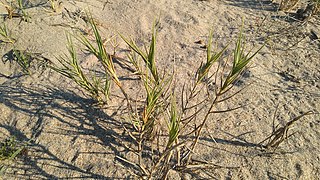
Stenotaphrum is a widespread genus of plants in the grass family.
Ophiuros is a genus of Asia, Australian, and East African plants in the grass family.

Parapholis is a genus of Eurasian and North African plants in the grass family.
Andropogon distachyos is a species of perennial herb in the family Poaceae. They have a self-supporting growth form and simple, broad leaves. Individuals can grow to 62 cm.
Brachypodium retusum is a species of perennial grass in the family Poaceae. They have a self-supporting growth form and simple, broad leaves and dry fruit. Individuals can grow to 0.8m tall.
Catapodium marinum is a species of annual herb in the family Poaceae. They have a self-supporting growth form and simple, broad leaves. Individuals can grow to 22 cm tall.
Catapodium rigidum (Ferngrass) is a species of annual grass in the family Poaceae. They have a self-supporting growth form and simple, broad leaves and dry fruit. Individuals can grow to 20 cm tall.
Cornucopiae cucullatum is a species of herb in the family Poaceae.
Cutandia maritima is a species of herb in the family Poaceae.
Elymus athericus is a species of perennial grass in the family Poaceae. They have a self-supporting growth form and simple, broad leaves. Individuals can grow to 65 cm tall.
Thinopyrum junceum is a species of perennial herb in the family Poaceae. They have a self-supporting growth form and simple, broad leaves. Individuals can grow to 52 cm tall.

Vulpia fasciculata is a species of annual herb in the family Poaceae. They have a self-supporting growth form and simple, broad leaves. Individuals can grow to 0.24 m.
Parapholis marginata is a species of grass in the family Poaceae.
Phalaris truncata is a species of herb in the family Poaceae. They are associated with freshwater habitat.
Piptatherum coerulescens is a species of perennial grass in the family Poaceae. They have a self-supporting growth form.

Scorzonera laciniata, also known as cutleaf vipergrass, is a species of herb in the family Asteraceae.
Polypogon maritimus is a species of annual herb in the family Poaceae. They have a self-supporting growth form. Individuals can grow to 0.17 m.

Polypogon viridis is a species of perennial grass in the family Poaceae. They have a self-supporting growth form and simple, broad leaves. Individuals can grow to 0.43 m.
Sphenopus divaricatus is a species of grass in the family Poaceae.

Sporobolus pungens is a species of perennial grass in the family Poaceae. They have a self-supporting growth form and simple, broad leaves. Individuals can grow to 0.17 m.





